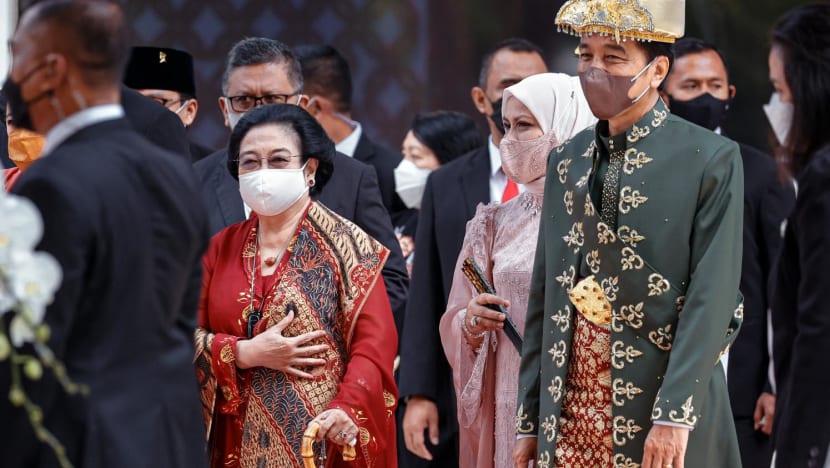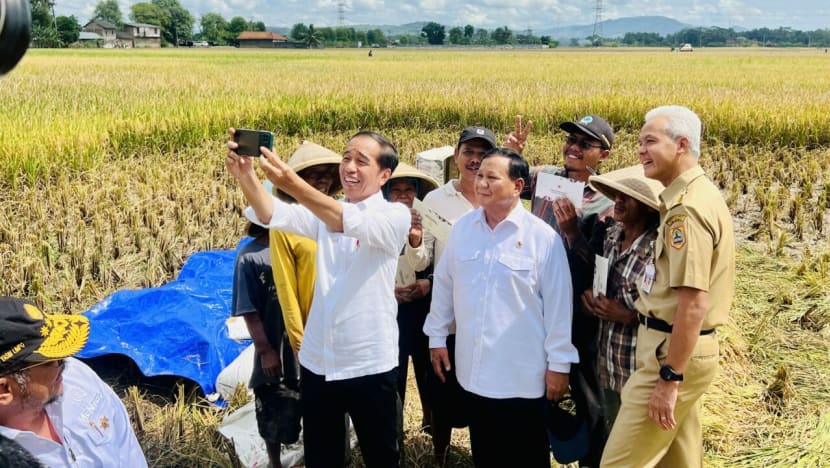Commentary: Battle of Indonesia’s kingmakers - a rift between Jokowi and Megawati?
The incumbent president of Indonesia Joko Widodo could tip the scales in the next election by sitting on the fence a little longer, says this ISEAS – Yusof Ishak Institute academic.

Head of the Indonesian Democratic Party of Struggle (PDI-P) Megawati Sukarnoputri (left) with Indonesian President Joko Widodo (right) and his wife Iriana Widodo (centre) leaving the parliament in Jakarta on Aug 16, 2022, the eve of the country's Independence Day celebrations. (Photo: AFP/Pool/Willy Kurniawan)
JAKARTA: There are two kingmakers who could determine the next president of Indonesia and they have competing interests.
The first is General Chairwoman of the Indonesian Democratic Party of Struggle (PDI-P) Megawati Sukarnoputri. PDI-P, which won 128 (or 22.26 per cent) of the lower house seats in the 2019 election, is the only party eligible to nominate a presidential candidate for 2024 without forming a coalition with other parties.
On Apr 21, the party named Central Java Governor Ganjar Pranowo as its preferred candidate.
The other is President Joko Widodo, popularly known as Jokowi. As president, Jokowi may be able to influence the choices of five out of seven governing coalition parties for their 2024 presidential and vice-presidential candidates.
Even if the PDI-P and media baron Surya Paloh’s National Democrats (NasDem) are not under Jokowi’s sway, the other five parties would view Jokowi’s gravity-defying popularity and his network of committed campaign volunteers (relawan) as assets.
SAME PARTY BUT DIFFERENT VIEWS
Megawati and Jokowi are from the same party but it is apparent that they have differing views on their preferred candidate.
Jokowi’s speech on May 14 during the Musyawarah Rakyat (Musra, or people’s discussion) organised by his supporters suggests that he does not necessarily support Ganjar for 2024.
The Musra poll was previously conducted in 30 provinces to informally collect information on the choices of volunteers and the public on their preferred presidential candidates. The Musra poll’s results showed Defence Minister Prabowo Subianto and Ganjar as the top two preferred candidates.
The indeterminate results might in turn reflect Jokowi’s ambiguous attitude toward both choices.
The fieriness of Jokowi’s speech on May 14 was unusual for him. He urged his supporters to exercise patience and to refrain from rushing to pick a candidate he personally favoured. He stated that he would quietly inform parties which candidate he would support for the February 2024 presidential election.
JOKOWI HAS OTHER PLANS
This statement has created some ruckus since his own party, the PDI-P, has already officially declared Ganjar as its preferred candidate. The inclusion of Prabowo and Golkar chairperson Airlangga Hartarto with Ganjar on the May 14 Musra’s recommended list of possible presidential election candidates suggests that Jokowi still has not decided whom he will support.
Jokowi has stated repeatedly that the next elected president must be courageous and firm. A 2021 poll by Indikator revealed that a majority of respondents who cited assertiveness as an essential quality for a presidential candidate would vote for Prabowo if elections were to be held today.
In his May 14 speech, Jokowi stated that leaders must hear the voice of the people and not be influenced by elites. Some analysts believe that Jokowi’s statement was directed at Ganjar, who is rumoured to have signed a “political contract” with Megawati.
Even though this claim has been reported by limited circles, there is talk that Ganjar must allow Megawati to choose his vice-presidential running mate and the PDI-P to decide the composition of Ganjar’s cabinet. Ganjar has denied these rumours.
For his part, Jokowi is said to be less enthusiastic about endorsing Ganjar because he was not involved in PDI-P’s decision-making process. Reportedly, it was just after the president arrived in Solo (Central Java) for an unrelated trip that Jokowi was told PDI-P would declare its support for Ganjar’s candidacy in Bogor (West Java).
While Jokowi attended the nomination event, his original itinerary suggests that he might not have been told in advance and may have been excluded from the PDI-P inner circle’s deliberations.
A DELICATE BALANCING ACT
However, as is typical of Jokowi, he has not burned bridges with Ganjar. In his May 14 speech, Jokowi also emphasised that a leader must be close to the people. Ganjar, according to Indikator’s surveys, is a figure seen as a man of the people (merakyat). Jokowi will likely bide his time and balance his support for Ganjar and Prabowo.

In this author’s view, Jokowi has implemented this strategy so that Prabowo and Ganjar would clear the first round of the presidential election and go head-to-head in a second round.
For months, various credible polls have indicated that none of the three leading candidates - Prabowo, Ganjar, or Anies - will be a dominant contender sweeping up more than 50 per cent of the national vote.
By touting Ganjar and Prabowo as a possible successor, Jokowi might be hoping that both would easily advance to the run-off. Often in third place in recent polls, former Jakarta governor Anies Baswedan, who is running on a campaign platform as the candidate of change and is clearly Jokowi’s least favoured, is expected to lose in a three-way race.
Given his huge popularity, Jokowi’s clear endorsement of either Ganjar or Prabowo would certainly influence the 2024 election outcome. Two prominent survey organisations, LSI and SMRC, recently reported that public approval of Jokowi has reached 82 per cent.
JOKOWI’S PERSONAL STAKE
In recent polls, increases in support for Prabowo might be attributable to Jokowi’s repeated endorsement of Prabowo as a potential candidate, while Ganjar’s popularity decreased especially after he (and PDI-P) opposed Israel’s young athletes’ participation in the under-20 FIFA World Cup (originally planned to be held in Indonesia) earlier this year.
Jokowi has a personal stake in the outcome of the 2024 presidential election and would like to ensure that his successor comes from his political camp. This will secure his presidential legacy while giving him political protection when he steps down in October 2024.
Unlike his predecessors, who had party strongholds, Jokowi has no direct control of any political party.
As a result, Jokowi could be withholding his explicit endorsement for any one candidate to improve his bargaining position, especially vis-a-vis the PDI-P. Jokowi’s strength lies in his strong supporter and volunteer networks.
Even if he cannot run for a third presidential term, these networks in lieu of a party machinery may represent Jokowi’s indirect support, and even provide concrete votes, for the person he eventually anoints.
Burhanuddin Muhtadi is Visiting Fellow in the Indonesia Studies Programme at ISEAS – Yusof Ishak Institute, and Senior Lecturer at Islamic State University Syarif Hidayatullah. This commentary first appeared on ISEAS – Yusof Ishak Institute’s blog, Fulcrum.
















